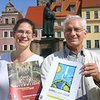The fourth thematic year in the Luther decade is called "The Reformation and Music"

Martin Luther is called the 'Wittenberg Nightingale' due to his many sung verses. From congregational singing through to family music, the reformation laid down a foundation stone down for German music, particularly evangelical church hymns. The 2012 thematic year in the Luther decade is therefore called "The Reformation and Music." Preparations are currently in full swing.The office window of Johannes Winkelmann looks out over the market, with the historic town hall and the life-sized bronze statues of two men who were VIPs in their town, even when they lived: Luther and Melanchthon. They were the leaders of the reformation, 500 years ago. "Vom Himmel hoch, da komm ich her...“ A brass ensemble has unpacked its instruments and is performing in front of the Luther memorial. Martin Luther wrote it as a Christmas song for his children in 1535. In the autumn of 2008, the ten-year event was officially opened, with the 500th anniversary of the reformation in 2017 set to be the highlight. Since then, each year has been celebrated with a different theme. In 2012, it will be called 'The Reformation and Music'. Ideas and concepts are taking shape. The last festive verse of "Vom Himmel hoch...." comes through the window. It provides the keyword for a festival which celebrated its premiere this summer and which is sure to be repeated in the thematic year of 'The Reformation and Music'. The international music festival "Himmel auf Erden“ (Heaven on Earth) (www.musikfestival-wittenberg.de) is attending Wittenberg from the 6 until the 15 July 2012 with "Songs of the World“. With the motto of "Mitten im Leben (In the midst of life)", ensembles from all over the world will turn their religions and cultures into a musical dialogue. Music builds bridges. The reformer knew how to use the emotional effect of music. "Tourists exploring the region by bike are now part of this town's way of life," explains Winkelmann. As he is a professional in the area of cultural tourism, he has had this target group long in focus. He puts a finished flyer for 2012 on the table: "Musik in Schlosskirche und Stadtkirche – Music in Castle Churches and Town Churches." Anyone who makes an excursion to Wittenberg on the Sundays can be pretty certain of experiencing musical entertainment here in the morning or the afternoon (www.schlosskirche-wittenberg.de). Summer guests like to spend a little longer in Wittenberg, enjoying the evening theatre on the original locations of the reformation (www.buehnewittenberg.de). And ten days before the reformation day, on 21 October 2012, the traditional Wittenberg Renaissance Music Festival is starting (phone +49 (0)3491 / 459620; www.wittenberger-renaissancemusik.de).The "Luther 2017 – 500 Years Reformation“ of the evangelical church in Germany (EKD) is based in the historic town hall on the other side of the market. Here, Cordelia Krause, a former student of cultural management, has been responsible for the conceptualisation and completion of cultural projects in the Luther decade since 2009. "Music chases the blues away and brings joy." In this Lutheran sense, 2012 is her personal year, laughs Cordelia. She is the glowing supporter of an idea which has national appeal. "366 + 1 – Kirche klingt (church music)“ is a creation of the Berlin cultural office of the EKD. 2012 is a leap year: On each of the 366 days, there is 1 extra event, the church hymn. In all of the land churches of the EKD, every week, one of those from the 2012 collection of songs is to be sung or performed (www.kultur.ekd.de).Another spatially near project is being organised by the EKD together with the Schlosskirche Wittenberg: In the 'International Choir forum 2012" from May to October, every Sunday from 15 to 16 hrs, international amateur choirs perform traditional protestant songs (registration via phone +49(0)361 / 430453150). And on the market square, where the brass band is still performing next to Luther, Cordelia Krause can see that the stage for an open-air cantata is now ready. "According to the written records, Luther was also a good singer," she explains. On 3 June 2012, selected choirs from near and far will be visiting Wittenberg, performing the cantata Du meine Seele singe by Walter Rein. Cordelia is also looking forward to finding out the results of a composing competition: "I am very curious about the possible musical renditions of "Ein feste Burg ist unser Gott" or "Nun freut Euch liebe Christen g’mein‘ musikalisch alles machen kann.“ She did not specify a genre. "The only condition is that it must be possible for the work to be performed by a church choir," explains the project manager. Author: Kathrain GraubaumContacts:Cordelia Krause, Geschäftsstelle der Evangelischen Kirche in Deutschland (EKD)ph: 03491/505 27 16E-Mail: cordelia.krause@ekd.deJohannes Winkelmann, Geschäftsführer WittenbergKultur e.V.ph: +49 (0)3491 / 419260E-Mail: wbkultur@wittenberg.deTourist-Information Lutherstadt Wittenbergph: 03491/49860E-Mail: info@lutherstadt-wittenberg.deTickets and info are available through phone +49 (0)700 / 20082017All events and offerings on the thematic year at www.Luther2017.de

